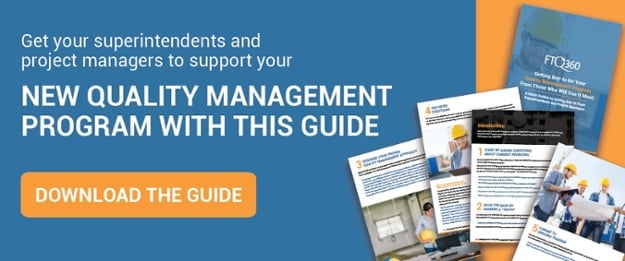
Effective construction quality management is an organization-wide effort, not just the responsibility of the quality program manager.
Getting key stakeholders on board to implement a quality control program requires effort from the beginning of the process.
In your role as quality program manager, the sooner you can gain support and build consensus with top management leaders, superintendents, project managers, and others, the easier it will be to roll out the systems and processes that support your quality program.
As the controllers of project budgets, project managers are important players in the quality program. A well-crafted quality management system, overseen by the quality program manager, is crucial for effective quality improvement. If they don't provide the resources needed to help the team achieve first-time quality, the project will be fighting an uphill battle right away on their quality program manager resume.
Fortunately, a quality program also supports project manager goals, so convincing them to invest in first-time quality is not as difficult as you might think.
Understanding the Role of Project Managers
Project managers are primarily concerned with budgets, timelines, and customer relationships. Since these elements are all connected, a skilled project manager needs to keep them all in balance. It will be easier for project managers to keep everything on track if systems are in place to prevent issues before they emerge. A quality program can help accomplish this over cross functional teams.
How a Quality Program Can Support Project Manager Goals
Cost is typically the biggest concern for project managers in project management. As the construction quality program manager, it's your responsibility to showcase how first-time quality enhances cost-effectiveness, meets stringent quality standards, fosters process improvement, and satisfies both internal and external stakeholders. Highlight these four key facets of first-time quality as you seek to build consensus with project managers.
Reduce Project Costs
Until proven otherwise, many project managers will view quality management as a cost centre. However, first-time quality is more cost-effective than redoing work because fixing defects always costs more than building it right the first time. Not only is rework very costly, but it can cause delays for both the crew and other subcontractors in project delivery.
A quality program can help project managers identify and hire the subcontractors and suppliers capable of performing quality work. And, once they are selected, your quality program can keep them on track for delivering first time quality, help recurring prevent issues, and keep the construction process under control, all of which contribute to lower costs.
Stay on Schedule
Rectifying tasks that should have been accurate initially not only leads to avoidable project delays but also places a burden on program management, supplier quality, and quality performance. A proficiently managed quality program can proactively mitigate these issues, promoting a smoother workflow.
During pre-construction, project managers and superintendents can identify errors that have happened before as well as concerns about potential issues and add those items to inspection checklists for continuous improvement.
By highlighting these items with subcontractors and crews before work starts, the project is more likely to stay on schedule.
Increase Customer Confidence
Project managers can demonstrate product quality to customers by discussing how the inspection process prevents problems and ensures that any mistakes are discovered and corrected before moving forward.
Project managers are often in the unfortunate position of dealing with unhappy customers after something has gone wrong. A quality program allows them to be proactive and avoid these uncomfortable interactions.
Getting buy-in from project managers and business partners is very important when developing a quality program, especially if the cost of the program is allocated to projects. If project managers don't see the value of quality program, they won't want to pay for the systems that help you achieve it.
The cost is worthwhile, but quality program managers must communicate this fact early in the process of building consensus in order to achieve buy-in from key stakeholders in the project.
If you have questions about how to gain support for a quality program in your organization, contact us today for more helpful tips.

